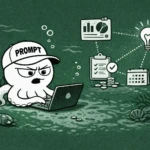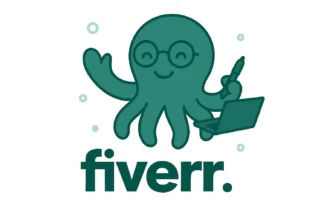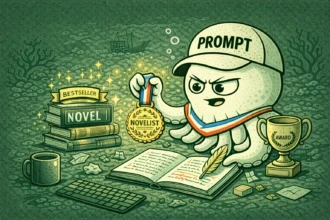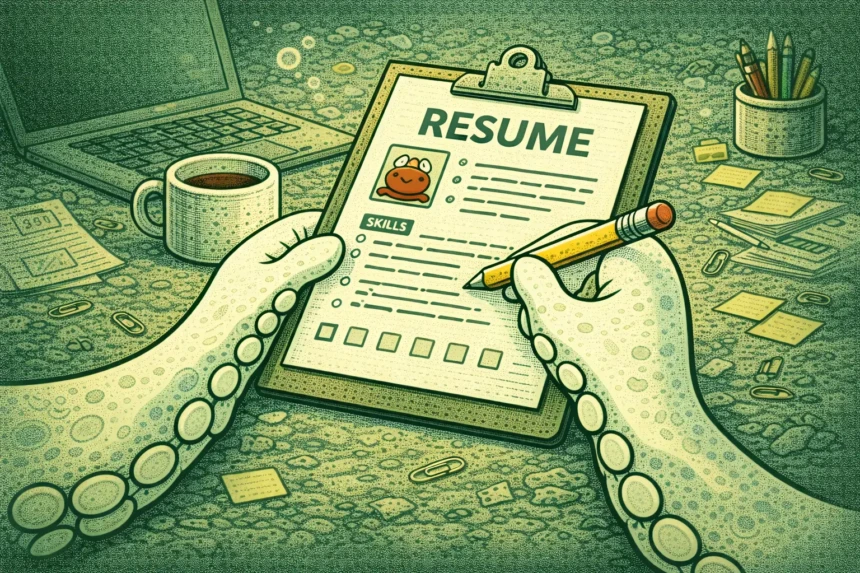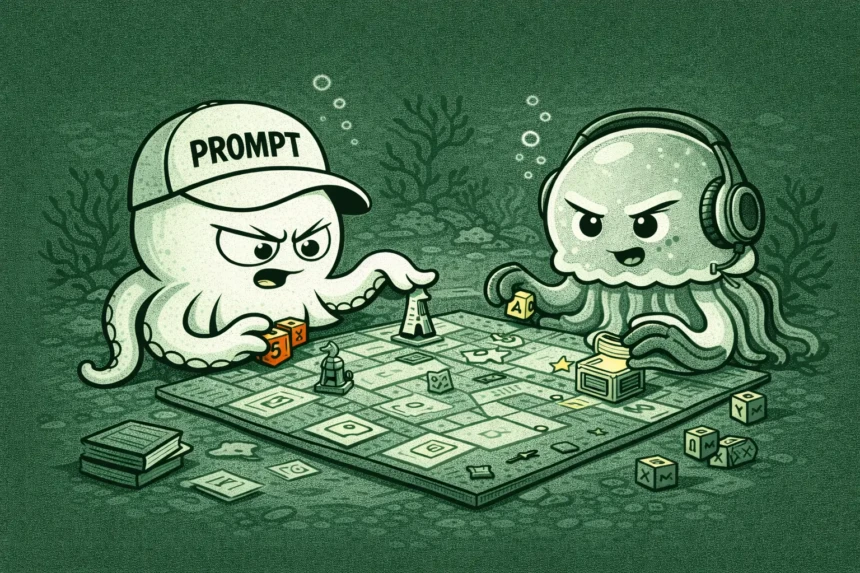PhD life is intense — papers to write, ideas to refine, and deadlines always creeping up.
- 1. Prompts to Refine Your Research Question
- 2. Prompts to Write a PhD Proposal Outline
- 3. Prompts to Summarize Long Academic Articles
- 4. Prompts to Organize Your Literature Review
- 5. Prompts to Improve Your Academic Writing
- 6. Prompts to Break Down Complex Theories
- 7. Prompts to Prepare for a Thesis Defense
- 8. Prompts to Manage Your Research Workflow
- 9. Prompts to Turn Notes Into a Conference Abstract
- 10. Prompts to Rephrase Complex Sentences
- How to Use These Prompts Effectively
- Wrap-Up
These ChatGPT prompts help you think clearer, write faster, and stay on top of your work.
Whether you’re stuck on your proposal, deep in data, or just need to simplify your notes, this guide helps you move forward without the overwhelm.
1. Prompts to Refine Your Research Question
#CONTEXT:
You have a topic, but your question is still too broad or vague.
#GOAL:
Turn your topic into a focused, researchable question.
#RESPONSE GUIDELINES:
• My topic: [insert topic or area of study]
• My field: [insert field/discipline]
• Suggest 3 specific research questions
• Keep them open-ended and academically relevant
• Optional: explain why each one is strong
#OUTPUT:
A clear research question I can use in my proposal or paper.ChatGPT Output
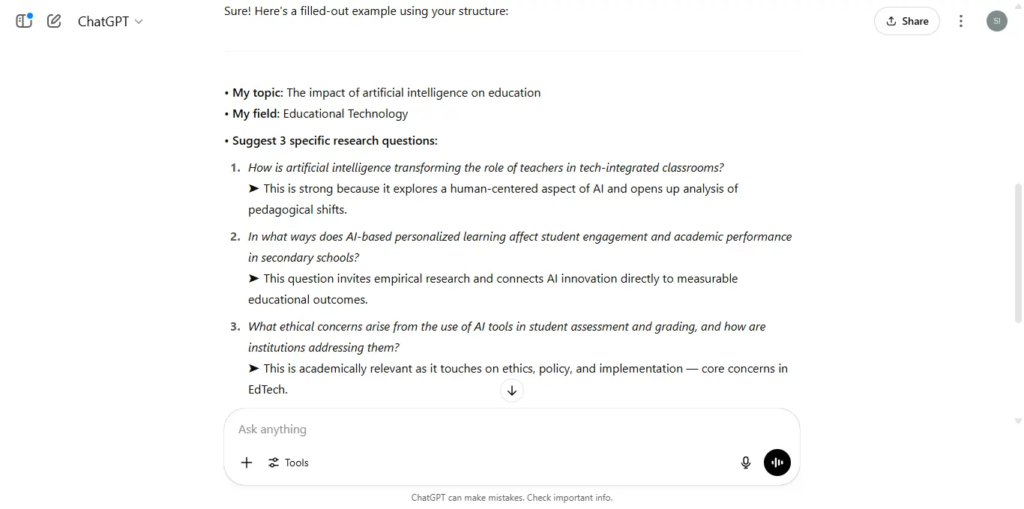
2. Prompts to Write a PhD Proposal Outline
#CONTEXT:
You’re getting ready to submit your research proposal and want a structured outline.
#GOAL:
Get a full outline with sections and what to include in each.
#RESPONSE GUIDELINES:
• Topic: [insert your research topic]
• Field: [insert academic area]
• Include sections: intro, research question, literature review, methods, expected results, timeline
• Tone: formal academic
• Optional: add bullet points under each section
#OUTPUT:
A proposal outline ready to build out or submit.3. Prompts to Summarize Long Academic Articles
#CONTEXT:
You’ve got dense papers to read and need to extract the key points quickly.
#GOAL:
Turn a long academic paper into a short summary.
#RESPONSE GUIDELINES:
• Paste the abstract or intro of the paper
• Field: [insert subject area]
• Focus on research question, method, key findings, and takeaway
• Limit to [insert word count: 150 words, 3 bullet points, etc.]
• Use plain language, not academic jargon
#OUTPUT:
A digestible summary I can use for my literature review.ChatGPT Output
4. Prompts to Organize Your Literature Review
#CONTEXT:
You have tons of sources and need to sort them into themes or arguments.
#GOAL:
Create a structure for your literature review.
#RESPONSE GUIDELINES:
• Research topic: [insert your focus]
• List your key sources: [insert titles or summaries]
• Suggest 3–5 themes or categories
• Assign each source to a theme
• Format it as a draft outline
#OUTPUT:
A lit review framework that’s ready to write from.5. Prompts to Improve Your Academic Writing
#CONTEXT:
You’ve written a draft — now you want to make it sound more academic, clear, and tight.
#GOAL:
Rewrite a paragraph or section for tone, clarity, and structure.
#RESPONSE GUIDELINES:
• Paste paragraph: [insert]
• Audience: [insert: academic journal, committee, conference]
• Tone: formal, neutral, academic
• Improve flow, sentence structure, and vocabulary
• Keep original meaning
#OUTPUT:
A polished version of my draft that’s ready for review.ChatGPT Output
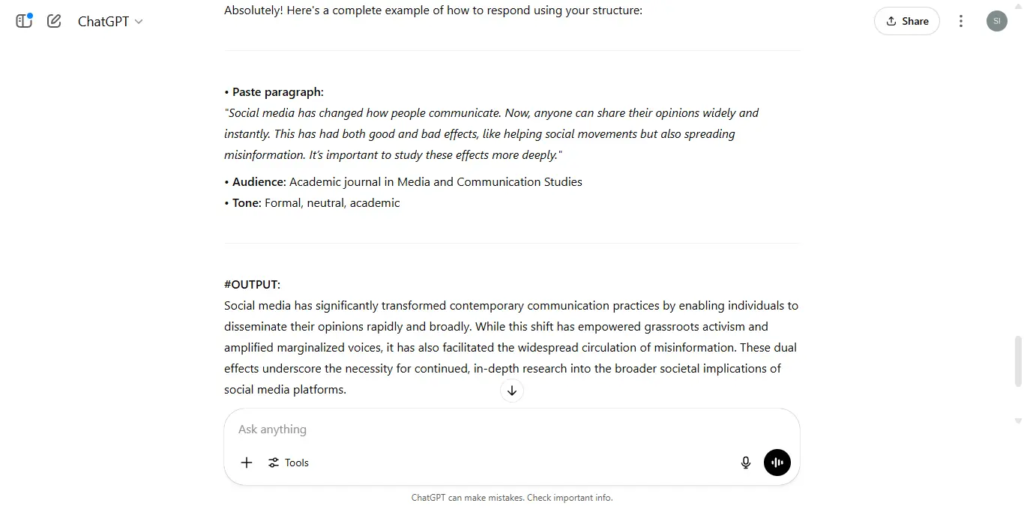
6. Prompts to Break Down Complex Theories
#CONTEXT:
You’re working with a complex framework or theory and need to understand it clearly.
#GOAL:
Simplify a dense concept so you can explain it confidently.
#RESPONSE GUIDELINES:
• Theory or framework: [insert name or quote]
• Field: [insert area of study]
• Explain it in plain English
• Add 1 real-world example
• Optional: limit to 150 words
#OUTPUT:
A simplified version I can use in writing, discussion, or teaching.7. Prompts to Prepare for a Thesis Defense
#CONTEXT:
Your defense is coming up — and you want to anticipate the hard questions.
#GOAL:
List likely questions and how to answer them clearly.
#RESPONSE GUIDELINES:
• My research topic: [insert]
• Program or degree: [insert: PhD in X]
• Suggest 5–7 common defense questions
• Write short, sample responses for each
• Tone: calm, confident, academic
#OUTPUT:
A prep sheet for my viva or defense session.ChatGPT Output
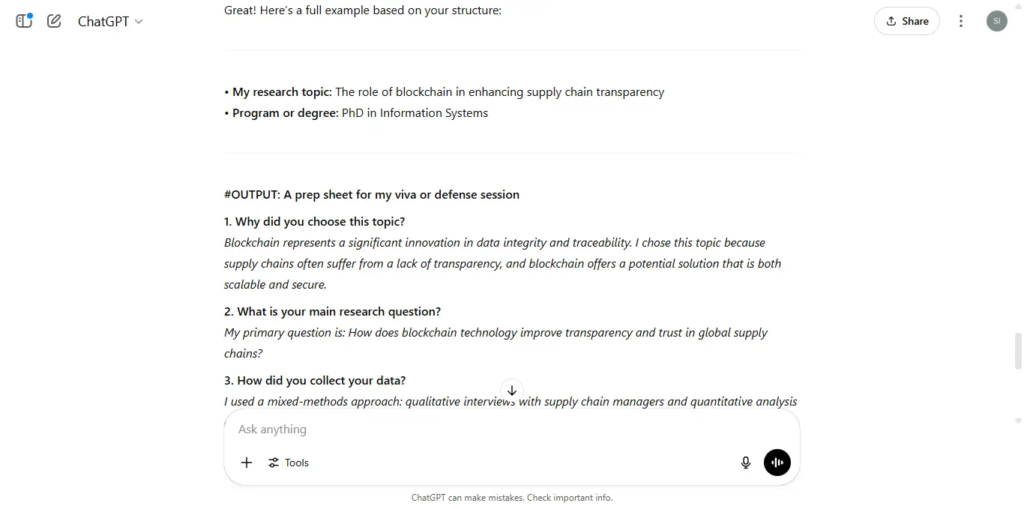
8. Prompts to Manage Your Research Workflow
#CONTEXT:
You’ve got reading, writing, data, and admin tasks — and need a weekly system.
#GOAL:
Create a workflow to stay organized and consistent.
#RESPONSE GUIDELINES:
• Current research stage: [insert: writing, data collection, analysis, etc.]
• Time per week: [insert hours available]
• Break into reading, writing, and admin blocks
• Suggest daily or weekly plan
• Optional: include time for breaks and check-ins
#OUTPUT:
A realistic schedule I can follow without burning out.9. Prompts to Turn Notes Into a Conference Abstract
#CONTEXT:
You have notes or a partial draft — now you need a clean, 200–300 word abstract.
#GOAL:
Write a conference abstract that’s clear, structured, and ready to submit.
#RESPONSE GUIDELINES:
• Topic: [insert subject]
• Notes: [insert key points or argument]
• Audience: [insert: discipline or conference type]
• Include: intro, research question, method, results, conclusion
• Keep it formal and under [insert word limit]
#OUTPUT:
A complete abstract I can copy into my submission.ChatGPT Output
10. Prompts to Rephrase Complex Sentences
#CONTEXT:
Some of your sentences are too long, unclear, or just don’t sound right.
#GOAL:
Rewrite complex academic sentences for better clarity and tone.
#RESPONSE GUIDELINES:
• Sentence to revise: [insert text]
• Audience: [insert: advisor, journal, peer reviewers]
• Improve grammar, clarity, and flow
• Keep formal tone
• Suggest 2–3 alternatives
#OUTPUT:
Clean, readable versions of complex academic sentences.How to Use These Prompts Effectively
• Work section by section
Use a different prompt for each part of your thesis or task.
• Feed it your real content
The more context you give — the better ChatGPT can help you sharpen it.
• Ask for tone adjustments
Say “make this sound journal-ready” or “explain this for committee use.”
• Save your best responses
Turn strong outputs into templates for future chapters or papers.
• Use it as a thinking partner
Stuck? Just talk to it. Use it to explore angles, simplify thoughts, or test how things sound.
Wrap-Up
PhD work is hard — but it doesn’t have to be chaotic.
These ChatGPT prompts help you clarify your thoughts, write faster, and stay on track.
Use them to move from “overwhelmed” to “done” — one step, one section, one sentence at a time.




